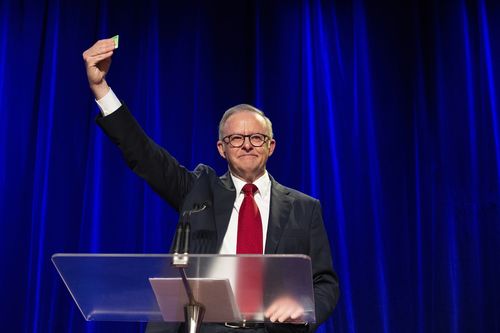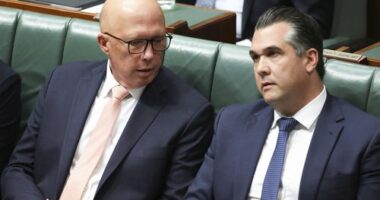This is a story written by CNN correspondents on the ground in Australia.
Australia’s Prime Minister Anthony Albanese has won a second term in office, beating his conservative opponents in a night full of surprises. Voters opted for stability over change amidst the chaos caused by US President Donald Trump globally.

Labor handed a strong mandate
During his first term, Albanese focused on improving Australia’s relationship with China, successfully removing tariffs that were imposed before his time. His administration also worked on strengthening ties with Pacific island nations to prevent China from expanding its influence in the region. Albanese plans to continue his foreign policy approach.
However, critics have pointed out that Albanese’s government did not take strong measures to address the increasing cost of living during a period of global inflation. Looking forward, he has proposed initiatives such as tax cuts, reduced medicine prices, lower down payments for first-time homebuyers, and the construction of 1.2 million homes to alleviate the housing shortage.
Albanese first took office in the so-called “climate election” of 2022, with promises to cut Australia’s carbon emissions and reach net zero by 2050. Despite a rapid rollout of renewable projects – enough to power 10 million homes – his government has been criticized for also approving new coal and gas projects.
On Saturday, Albanese reiterated his commitment to climate action in contrast to the rolling assault inflicted by the new US administration on environment agencies and research.
All Australians know “renewable energy is an opportunity we must work together to seize for the future of our economy,” Albanese said to cheers.
The Liberal Party’s loss means Dutton’s plan to build seven nuclear plants at public expense won’t move forward, a proposal critics said was a stalling tactic to extend Australia’s reliance on fossil fuels.
“Today’s election result shows that Australians have comprehensively rejected the Coalition’s Trumpist agenda of climate and nature destruction, and its plan to force dangerous nuclear on communities,” said David Ritter, CEO of Greenpeace Australia Pacific.
Dutton’s loss ends a long political career for the ex-police officer who held high-profile roles as minister for defense, immigration and home affairs in the former Coalition government.
Dutton assumed the Liberal leadership after Morrison’s election loss in 2022 and brought with him a reputation as a strongman of the party’s right wing. During the 2025 election campaign, Dutton chided the prime minister for failing to secure exemptions from the US president’s global tariffs, and said he could have negotiated a better deal.
As polls started to suggest voters were turned off by his Trump-style approach, Dutton seemed to try to put some distance between himself and the US leader. But in the final week of campaigning, he seemed to again tap into Trump rhetoric, referring to Australia’s national broadcaster and left-leaning newspaper The Guardian as “hate media.”
In 2023, Dutton launched himself into contention as prime minister by successfully campaigning against the government’s referendum on the Voice proposal, which included constitutional recognition for Indigenous Australians.
Dutton had called the Voice referendum divisive, because it proposed to give one group recognition over another. For the same reason, he said Aboriginal and Torres Strait Islander flags would no longer be present at press conferences under his leadership – because all Australians should be united under one flag. Albanese took the opposing view.
As he claimed victory, Albanese made a deliberate attempt to cast himself as a “kinder” leader, in contrast to the model offered by an administration he accused his rival of emulating.
“Now that the Australian people have made their clear choice, let us reflect on what we have in common, because no matter who you voted for, no matter where you live, no matter how you worship, or who you love, or whether you belong to a culture that has known and cared for this great continent for 65,000 years, or you have chosen our nation as your home and enrich our society with your contribution, we are all Australians,” Albanese said.








